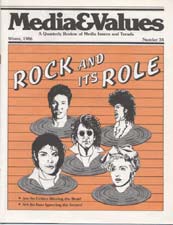YOUTH: Music Choices Shape Life Skills
|
This article originally appeared in Issue# 34
|
For many youth today, rock music is a battlefield.
This is not the decades-old war of the decibels but one that is fought over lyrics. Active Christian youth especially, plus the adults in their lives, have been influenced by persuasive troops of several organizations making big bucks by proclaiming all of rock music as the work of the devil.
(Note - "all" is a flexible term in this discussion. Some of the groups produce their own alternative rock records, and "all" conveniently eliminates those selections.)
Personally, I find it very sad when a young person proudly proclaims she or he "has listened only to Christian rock for eleven and a half months since I turned my rock records over to the Lord." A position to respect, but it is sad nonetheless.
At the same time, I am also disturbed by youth and others who feel that they must (and feel they are able to) defend "all" rock music. Thirty minutes with most rock stations should offer any thinking person a long list of concepts to question.
But what of the battle itself? Is it a meaningless skirmish that is not worth the time and effort?
Quite the contrary, this is not a side issue.
The issue is not so much the music as it is youth's perception of the music. The same words and melody will often bring about opposite reactions in two persons. The way a youth can learn to make choices of rock will have a definite relationship to other areas.
There are few places where youth can learn the skills for relating faith and values to media, especially rock. Schools and families have tended to ignore its messages; print media tends to exploit rock and accept it at face value; religious groups get a lot of attention riding the fear issue.
I nominate youth groups as a natural arena to examine rock messages and critique values, not for group consensus but for individual skill development.
At regular intervals, have every member of your youth group bring one record with meaning to him or her. Leaders should bring a record, too — current or past!
During the sharing, there's only one rule: no one can make a derogatory comment about anyone's song or its meaning to the person. Relatively free from ridicule and hysteria on the one hand and defensiveness on the other, the atmosphere can allow honest exploration, even Bible study related to the lyrics.
And when meaningful messages are discovered, they can be used in various ways in the life of the group to signify current positive appraisal - in wall posters, singing, program themes, newsletter mention, and definitely in worship, either sung or in a litany or prayer.
And when contemporary media can be authentically lifted in worship, it symbolizes the triumph of the faith message to exist.



